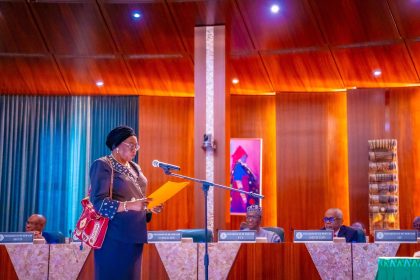
Kudirat Kekere-Ekun was inaugurated on Friday as the acting Chief Justice of Nigeria (CJN), pledging to spearhead reforms to restore public confidence in the Nigerian judiciary.
She disclosed the highlights of her agenda while speaking to journalists after her inauguration by President Bola Tinubu at the State House.
Among other promises, Ms Kekere-Ekun expressed commitment to restoring public confidence in the judiciary, a goal she intends to achieve through collective efforts and collaboration with stakeholders.
“We will make sure that people have more confidence in the judiciary, and I believe that it is not a one-man job. We all have to be on board because we all see the areas that need improvement.
“I believe that there will be maximum cooperation because we all want to see a better judiciary,” she said.
Ms Kekere-Ekun spoke from her wealth of knowledge of the ills of the judiciary.
Waning confidence in judiciary
The Nigerian judiciary is plagued by delays, inconsistent and questionable court decisions, budgetary and financial opacity, disciplinary and appointment processes shrouded in secrecy, and political interference, among other problems.
The candid admission made by Nigerian senator Adamu Bulkachuwa in June 2023 about his influence over his wife Zainab’s decisions while she served as a judge and the President of the Court of Appeal provided unique insights into the backroom transactions that result in many of the erroneous rulings that come from Nigerian courts. The admission was made at a point in time when the Nigerian Supreme Court was still trying to rebuild its reputation following the ruling made by Ms. Kekere-Ekun in January 2020, which removed Emeka Ihedioha from office as governor of Imo State and installed Hope Uzodinma, who finished far behind in the results announced by INEC.
Since then, a number of rulings have resulted in increased public criticism of the Supreme Court and the Nigerian judiciary as a whole. One such ruling was that of February 2023, which upheld Ahmad Lawan’s candidature for the All Progressives Congress (APC) in the Yobe North senatorial district. These have added to the public’s declining trust in the courts, which is seen to have decreased even more under the administrations of Tanko Muhammad and Olukayode Ariwoola, Ms. Kekere-Ekun’s final two successors. Both inside and beyond the legal profession, there is widespread knowledge of the judiciary’s current crisis of confidence.
Taking stock of Mr Muhammad’s tenure, which abruptly ended in June 2022 amid a protest against his leadership by his colleagues on the Supreme Court bench, then-president of the Nigerian Bar Association (NBA) Olumide Akpata called for an urgent reform of the judiciary. “Beyond this, there is near-universal agreement that public confidence in the Judiciary and, indeed, the legal profession is at an all-time low,” Mr Akpata said. Also speaking to the loss of public trust in the judiciary in March last year, preparatory to the hearing of the presidential election petition cases, the outgoing NBA president, Yakubu Maikyau, who succeeded Mr Akpata, urged the presidential election court to allow a live transmission of its proceedings to “help to regain lost public trust. The court eventually rejected the petitioners’ application for live transmission of proceedings. Public trust in the judiciary never stopped waning.
Fourteen months later, in May this year, Mr Maikyau reacted in a statement seething with anger to another development that dealt a fresh blow to public trust in the institution. At that time, it was the embarrassing conflicting court judgements regarding the Kano Emirship tussle. Mr Maikyau said the conflicting court decisions “brought utter disgrace and shame to the profession” and “have exposed the entire legal profession in Nigeria to public ridicule and opprobrium.” In what will stick as a parting remark as he leaves office in a week, Mr Maikyau urged Nigerian judges to justify their new pay rise by making “a deliberate and conscious effort to work back into the hearts of Nigerians and revive public confidence in the Judiciary.” He said the NBA has consistently pushed for reforms in “matters of appointment, discipline and elevation of judicial officers”. Whatever Mr Ariwoola might have achieved during his two years as CJN was eclipsed by the controversial appointment of family members, including his son as a federal judge, to top positions in the judiciary institutions that he directly or indirectly superintended over. Mr Maikyau said there is a need to strengthen judicial oversight bodies, expressing hope that his successor, Afam Osigwe, the NBA president-elect, will prioritise the issues when he takes office this month. More promises Ms Kekere-Ekun said on Friday that she looked forward to securing internal cooperation to achieve her goals. She called for a concerted effort to pinpoint and address deficiencies within the judiciary. She said improvements in the judiciary would have a positive ripple effect across the nation. Addressing concerns regarding the appointment process and judicial discipline, she vowed to tackle these issues comprehensively. She promised to leave behind a judiciary that the country can proudly stand behind, marked by enhanced operational efficacy and public trust.
Tinubu also speaks on integrity of judiciary During the inauguration ceremony on Friday, President Tinubu similarly stressed the importance of strengthening mechanisms that will uphold and enhance integrity, discipline, and transparency in the judiciary. He urged the new acting CJN to defend the independence of the judiciary and promote the cause of justice. He tasked her with upholding the highest standards of integrity and fidelity to the Constitution. President Tinubu also encouraged reforms to bolster public trust in the judiciary. The president also expressed support for the judiciary, citing the December 2023 appointment of 11 new Justices to the Supreme Court. He said the expansion has restored the Court to its full complement of 21 Justices for the first time in decades. Sixty-six-year-old Ms Kekere-Ekun has four years to stay in office as Nigeria’s 23rd chief justice, 18th CJN and the second female CJN after Aloma Mukhtar to realise her dreams of a Nigerian judiciary.

